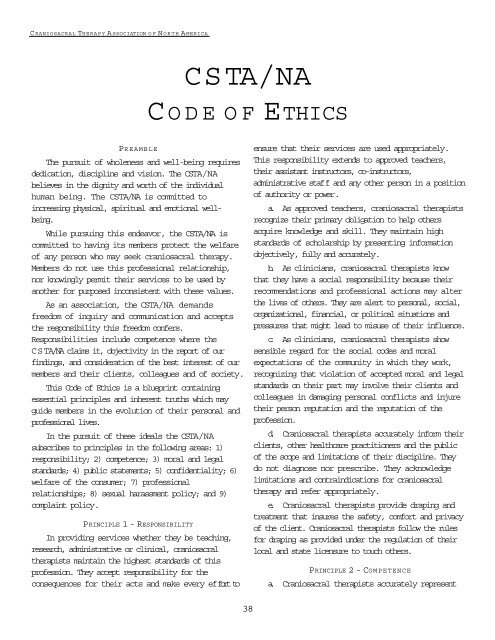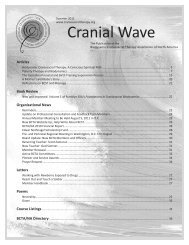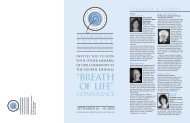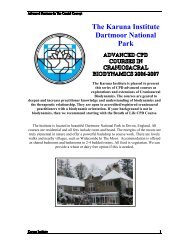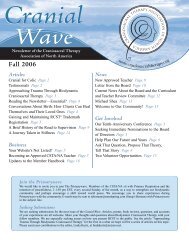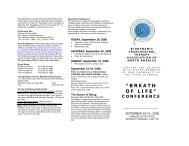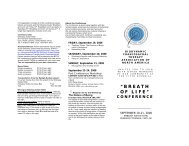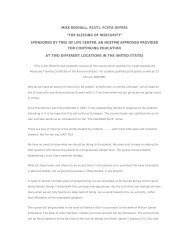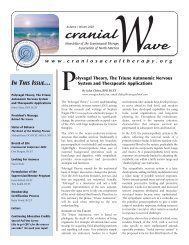Code of Ethics.pdf - Biodynamic Craniosacral Therapy Association ...
Code of Ethics.pdf - Biodynamic Craniosacral Therapy Association ...
Code of Ethics.pdf - Biodynamic Craniosacral Therapy Association ...
Create successful ePaper yourself
Turn your PDF publications into a flip-book with our unique Google optimized e-Paper software.
C RANIOSACRAL THERAPY A SSOCIATION O F N ORTH A MERICA<br />
CSTA/NA<br />
C ODE OF ETHICS<br />
PREAMBLE<br />
The pursuit <strong>of</strong> wholeness and well-being requires<br />
dedication, discipline and vision. The CSTA/NA<br />
believes in the dignity and worth <strong>of</strong> the individual<br />
human being. The CSTA/NA is committed to<br />
increasing physical, spiritual and emotional wellbeing.<br />
While pursuing this endeavor, the CSTA/NA is<br />
committed to having its members protect the welfare<br />
<strong>of</strong> any person who may seek craniosacral therapy.<br />
Members do not use this pr<strong>of</strong>essional relationship,<br />
nor knowingly permit their services to be used by<br />
another for purposed inconsistent with these values.<br />
As an association, the CSTA/NA demands<br />
freedom <strong>of</strong> inquiry and communication and accepts<br />
the responsibility this freedom confers.<br />
Responsibilities include competence where the<br />
C S TA/NA claims it, objectivity in the report <strong>of</strong> our<br />
findings, and consideration <strong>of</strong> the best interest <strong>of</strong> our<br />
members and their clients, colleagues and <strong>of</strong> society.<br />
This <strong>Code</strong> <strong>of</strong> <strong>Ethics</strong> is a blueprint containing<br />
essential principles and inherent truths which may<br />
guide members in the evolution <strong>of</strong> their personal and<br />
pr<strong>of</strong>essional lives.<br />
In the pursuit <strong>of</strong> these ideals the CSTA/NA<br />
subscribes to principles in the following areas: 1)<br />
responsibility; 2) competence; 3) moral and legal<br />
standards; 4) public statements; 5) confidentiality; 6)<br />
welfare <strong>of</strong> the consumer; 7) pr<strong>of</strong>essional<br />
relationships; 8) sexual harassment policy; and 9)<br />
complaint policy.<br />
PRINCIPLE 1 - R ESPONSIBILITY<br />
In providing services whether they be teaching,<br />
research, administrative or clinical, craniosacral<br />
therapists maintain the highest standards <strong>of</strong> this<br />
pr<strong>of</strong>ession. They accept responsibility for the<br />
consequences for their acts and make every effortto<br />
ensure that their services are used appropriately.<br />
This responsibility extends to approved teachers,<br />
their assistant instructors, co-instructors,<br />
administrative staff and any other person in a position<br />
<strong>of</strong> authority or power.<br />
a. As approved teachers, craniosacral therapists<br />
recognize their primary obligation to help others<br />
acquire knowledge and skill. They maintain high<br />
standards <strong>of</strong> scholarship by presenting information<br />
objectively, fully and accurately.<br />
b. As clinicians, craniosacral therapists know<br />
that they have a social responsibility because their<br />
recommendations and pr<strong>of</strong>essional actions may alter<br />
the lives <strong>of</strong> others. They are alert to personal, social,<br />
organizational, financial, or political situations and<br />
pressures that might lead to misuse <strong>of</strong> their influence.<br />
c. As clinicians, craniosacral therapists show<br />
sensible regard for the social codes and moral<br />
expectations <strong>of</strong> the community in which they work,<br />
recognizing that violation <strong>of</strong> accepted moral and legal<br />
standards on their part may involve their clients and<br />
colleagues in damaging personal conflicts and injure<br />
their person reputation and the reputation <strong>of</strong> the<br />
pr<strong>of</strong>ession.<br />
d. <strong>Craniosacral</strong> therapists accurately inform their<br />
clients, other healthcare practitioners and the public<br />
<strong>of</strong> the scope and limitations <strong>of</strong> their discipline. They<br />
do not diagnose nor prescribe. They acknowledge<br />
limitations and contraindications for craniosacral<br />
therapy and refer appropriately.<br />
e. <strong>Craniosacral</strong> therapists provide draping and<br />
treatment that insures the safety, comfort and privacy<br />
<strong>of</strong> the client. <strong>Craniosacral</strong> therapists follow the rules<br />
for draping as provided under the regulation <strong>of</strong> their<br />
local and state licensure to touch others.<br />
PRINCIPLE 2 - C OMPETENCE<br />
a. <strong>Craniosacral</strong> therapists accurately represent<br />
38
C ODE OF ETHICS<br />
their competence, education, training, and<br />
experience. They claim as evidence for educational<br />
qualifications only those degrees and certifications<br />
obtained from institutions acceptable under the<br />
standards set forth by the CSTA/NA.<br />
b. As teachers, craniosacral therapists perform<br />
their duties on the basis <strong>of</strong> careful preparation so that<br />
their instruction is accurate, current, and scholarly.<br />
c. <strong>Craniosacral</strong> therapists recognize the need for<br />
continuing education and are open to new<br />
procedures and changes in expectations and values<br />
over time. <strong>Craniosacral</strong> therapists consistently<br />
maintain and improve their pr<strong>of</strong>essional knowledge<br />
and competence through regular assessment <strong>of</strong><br />
personal and pr<strong>of</strong>essional strengths and weaknesses<br />
and by continuing education and training in approved<br />
programs <strong>of</strong> the CSTA/NA.<br />
d. <strong>Craniosacral</strong> therapists recognize differences<br />
among people, such as age, sex, socio-economic,<br />
and ethnic backgrounds. When necessary, they<br />
obtain training, experience, or counsel to assure<br />
competent service or research relating to such<br />
persons or conditions that clients report.<br />
e. <strong>Craniosacral</strong> therapists recognize that<br />
personal problems and conflicts may interfere with<br />
pr<strong>of</strong>essional effectiveness. Accordingly, they refrain<br />
from undertaking any activity in which their personal<br />
problems are likely to lead to inadequate<br />
performance or harm to a client, colleague, student,<br />
or any other associate. If engaged in such activity<br />
when they become aware <strong>of</strong> their personal problems,<br />
they seek competent pr<strong>of</strong>essional assistance to<br />
determine whether they should suspend, terminate,<br />
or limit the scope <strong>of</strong> their pr<strong>of</strong>essional activities.<br />
f. <strong>Craniosacral</strong> therapists avoid deliberately<br />
provoking an emotional response in their clients with<br />
the use <strong>of</strong> psychological techniques and/or other<br />
body centered psychotherapies without an accredited<br />
academic degree or appropriate training, a<br />
supervised internship or ongoing supervision from a<br />
psychotherapist or psychiatrist.<br />
PRINCIPLE 3 - MORAL AND LEGAL STANDARDS<br />
a. As teachers, craniosacral therapists are<br />
aware <strong>of</strong> the fact that their personal values may<br />
affect the selection and presentation <strong>of</strong> instructional<br />
materials. When dealing with topics that may give<br />
<strong>of</strong>fense, they recognize and respect the diverse<br />
attitudes that students may have towards such<br />
materials.<br />
b. As employees or employers, craniosacral<br />
therapists do not engage in or condone practices that<br />
are inhumane or that result in illegal or unjustifiable<br />
actions. Such practices include but are not limited to<br />
those based on consideration <strong>of</strong> race, handicap, age,<br />
gender, sexual preference, religion, or national origin<br />
in hiring, promotion, or training.<br />
c. <strong>Craniosacral</strong> therapists are aware <strong>of</strong> their<br />
need for personal care and ongoing psychotherapy<br />
when working with psychological issues arising in<br />
their private practice between themselves and their<br />
clients. <strong>Craniosacral</strong> therapists strive to improve<br />
themselves not only through psychotherapy but also<br />
psychological supervision from a qualified mental<br />
health counselor, group support, body centered<br />
therapy and especially continuing education.<br />
d. <strong>Craniosacral</strong> therapists follow all policies,<br />
guidelines, regulations, codes and requirements<br />
promulgated by local, state and national authorities<br />
governing their legal right to touch their clients.<br />
e. <strong>Craniosacral</strong> therapists receive informed<br />
consent for every specific technique or modality they<br />
intend to use with a client. This includes the<br />
responsibility <strong>of</strong> informing the client during a session<br />
when the original contract has changed.<br />
Informed consent depends strongly on mutual<br />
trust, empathetic and compassionate attitudes and<br />
behaviour as well as the capacity for clear<br />
communication.<br />
f. <strong>Craniosacral</strong> therapists refuse any gifts or<br />
benefits in excess <strong>of</strong> acceptable gratuity which are<br />
intended to influence a referral, a decision or a<br />
treatment.<br />
PRINCIPLE 4- P UBLIC STATEMENTS<br />
a. When announcing or advertising pr<strong>of</strong>essional<br />
services, craniosacral therapists may list the following<br />
information to describe their services: name, highest<br />
relevant academic degree earned from a regionally<br />
accredited institution, relevant certifications or<br />
diplomas from CSTA/NA approved trainings, date,<br />
type, and level <strong>of</strong> certification or licensure,<br />
39
pr<strong>of</strong>essional membership status in the CSTA/NA,<br />
address, telephone number,<strong>of</strong>fice hours, a brief<br />
listing <strong>of</strong> the type <strong>of</strong> modalities <strong>of</strong>fered, and an<br />
accurate presentation <strong>of</strong> fee information, foreign<br />
languages spoken, and policy with regard to third<br />
party payments. Additional relevant or consumer<br />
information may be included if not prohibited by other<br />
rules and regulations in an individual s locale.<br />
b. In announcing or advertising the availability<br />
<strong>of</strong> craniosacral therapy products, publications, or<br />
services, craniosacral therapists do not present their<br />
affiliation with any organization in a manner that<br />
falsely implies sponsorship or certification by that<br />
organization. <strong>Craniosacral</strong> therapists do not make<br />
public statements that are false, fraudulent,<br />
misleading, deceptive or unfair. They do not<br />
misinterpret facts or make statements that are likely<br />
to mislead or deceive because in context it makes<br />
only a partial disclosure <strong>of</strong> relevant facts, especially<br />
comparing a style <strong>of</strong> craniosacral therapy to another<br />
with statements like "less invasive," "more forceful,"<br />
or other statements that make another style <strong>of</strong><br />
craniosacral therapy appear less than or the<br />
therapist(s) in question as more than, etc.<br />
c. <strong>Craniosacral</strong> therapists do not use<br />
testimonials from clients regarding the quality <strong>of</strong> their<br />
clinical services; nor do they use statements intended<br />
or likely to create false or unjustified expectations <strong>of</strong><br />
favorable results; nor do they use statements<br />
implying unusual, unique or one-<strong>of</strong>-a-kind abilities;<br />
nor do they use statements intended or likely to<br />
appeal to a client s fears, anxieties, or emotions<br />
concerning the possible results <strong>of</strong> failure to obtain<br />
their services such as, "Do you want your<br />
fibromyalgia to drag on forever?" or "Without this kind<br />
<strong>of</strong> treatment you may experience more symptoms,"<br />
etc.<br />
d. Announcements or advertisements for<br />
classes, sessions or clinics give a clear statement <strong>of</strong><br />
purpose and a clear description <strong>of</strong> the experiences to<br />
be provided.<br />
e. The education, training, and experience <strong>of</strong> the<br />
staff members are appropriately specified.<br />
<strong>Craniosacral</strong> therapists associated with the<br />
development or promotion <strong>of</strong> craniosacral therapy<br />
devices, books, or other products <strong>of</strong>fered for<br />
commercial sale make reasonable efforts to ensure<br />
that announcements and advertisements are<br />
presented in a pr<strong>of</strong>essional, and factually informative<br />
manner.<br />
f. <strong>Craniosacral</strong> therapists are guided by the<br />
primary obligation to aid the public in developing<br />
informed judgments, opinions, and choices.<br />
g. As teachers, craniosacral therapists ensure<br />
that statements in catalogues and course outlines are<br />
accurate and not misleading, particularly in terms <strong>of</strong><br />
subject matter to be covered, basis for evaluating<br />
progress, the nature <strong>of</strong> course experiences and who<br />
is teaching the course. Announcements, brochures or<br />
advertisements describing workshops, seminars, or<br />
other educational programs accurately describe the<br />
eligibility requirements, educational objectives, and<br />
the nature <strong>of</strong> the materials to be covered. These<br />
announcements also accurately represent the<br />
education, training, and experience <strong>of</strong> the<br />
craniosacral therapists presenting the programs and<br />
any fees involved.<br />
40
C ODE OF ETHICS<br />
PRINCIPLE 5 - C ONFIDENTIALITY<br />
a. Information obtained in the classroom, clinic<br />
or consulting relationships or evaluative data<br />
concerning children, students, employees, and<br />
others, is discussed only for pr<strong>of</strong>essional purposes<br />
and only with those clearly concerned with such and<br />
with the client s permission. Written and oral reports<br />
present only data germane to the purposes <strong>of</strong> the<br />
evaluation, and every effort is made to avoid undue<br />
invasion <strong>of</strong> privacy.<br />
b. <strong>Craniosacral</strong> therapists who present personal<br />
information obtained during the course <strong>of</strong><br />
pr<strong>of</strong>essional work in writings, lectures, or other public<br />
forums shall either obtain adequate prior consent to<br />
do so or adequately disguise all identifying<br />
information.<br />
c. All classroom processes are considered<br />
confidential and all staff, instructors and students<br />
shall honour and maintain the confidentiality <strong>of</strong> the<br />
classroom.<br />
d. <strong>Craniosacral</strong> therapists provide treatment only<br />
when there is reasonable expectation that it will be<br />
advantageous to the client.<br />
e. <strong>Craniosacral</strong> therapists respect the client s<br />
right to refuse, modify or terminate treatment<br />
regardless <strong>of</strong> prior consent given. <strong>Craniosacral</strong><br />
therapists promote active verbal input by the client.<br />
f. <strong>Craniosacral</strong> therapists respect the client s<br />
boundaries with regards to emotional expression,<br />
beliefs, and reasonable expectations <strong>of</strong> pr<strong>of</strong>essional<br />
behaviour <strong>Craniosacral</strong> therapists respect their clients<br />
autonomy. The same is true for teachers <strong>of</strong><br />
craniosacral therapy and their students.<br />
PRINCIPLE 6 - WELFARE O F THE C ONSUMER<br />
a. <strong>Craniosacral</strong> therapists are continually<br />
cognizant <strong>of</strong> their own needs and <strong>of</strong> their potentially<br />
influential position with clients, students, and<br />
subordinates. They avoid exploiting the trust and<br />
dependency <strong>of</strong> such persons. <strong>Craniosacral</strong> therapists<br />
make every effort to avoid dual relationships that<br />
could impair their pr<strong>of</strong>essional judgement or increase<br />
the risk <strong>of</strong> exploitation. Examples <strong>of</strong> such dual<br />
relationships include, but are not limited to,<br />
socializing, doing research with, treating or engaging<br />
in a fiduciary relationship with employees, students,<br />
supervisees, close friends, or relatives.<br />
b. Sexual intimacies with clients are unethical.<br />
Hiring a student, socializing with students, hiring<br />
family members are examples <strong>of</strong> dual relationships.<br />
c. Teachers may not do private sessions with<br />
students during a training period, or in-between<br />
training segments unless otherwise required as a<br />
prerequisite to the training itself.<br />
d. <strong>Craniosacral</strong> therapists have the right to<br />
refuse to attend prospective clients. However once<br />
accepted, they owe their clients complete loyalty,<br />
care, attention, and integrity. <strong>Craniosacral</strong> therapists<br />
strive to complete all necessary sessions with their<br />
clients. They will discontinue services only when self<br />
respect, dignity, or other good cause requires this<br />
action.<br />
e. <strong>Craniosacral</strong> therapists terminate a clinical,<br />
teaching, or consulting relationship when it is<br />
reasonably clear that the consumer is not benefiting<br />
from it. They <strong>of</strong>fer to help the consumer locate<br />
alternative sources <strong>of</strong> assistance.<br />
PRINCIPLE 7 - P ROFESSIONAL R ELATIONSHIPS<br />
a. <strong>Craniosacral</strong> therapists understand the areas<br />
<strong>of</strong> competence <strong>of</strong> related pr<strong>of</strong>essions. They make full<br />
use <strong>of</strong> all the pr<strong>of</strong>essional, technical, and<br />
administrative resources that serve the best interest<br />
<strong>of</strong> their clients. The absence <strong>of</strong> formal relationships<br />
with other pr<strong>of</strong>essions and pr<strong>of</strong>essional workers does<br />
not relieve the craniosacral therapist <strong>of</strong> the<br />
responsibility <strong>of</strong> securing for their clients the best<br />
possible pr<strong>of</strong>essional service, nor does it relieve them<br />
<strong>of</strong> the obligation to exercise foresight, diligence, and<br />
tact in obtaining the complementary assistance<br />
needed by clients.<br />
b. <strong>Craniosacral</strong> therapists know and take into<br />
account the traditions and practices <strong>of</strong> other<br />
pr<strong>of</strong>essional groups, especially in the medical and<br />
osteopathic community and they work and cooperate<br />
fully with such groups. If a person is receiving similar<br />
services from another pr<strong>of</strong>essional, craniosacral<br />
therapists do not <strong>of</strong>fer their own services directly to<br />
such a person. If a craniosacral therapist is contacted<br />
by a person who is already receiving similar services<br />
from another pr<strong>of</strong>essional, he or she carefully<br />
considers that pr<strong>of</strong>essional relationship and proceeds<br />
41
with caution and sensitivity in regards to the<br />
therapeutic issues as well as the client s welfare. The<br />
craniosacral therapist is obligated to discuss these<br />
issues with the client so as to minimize the risk <strong>of</strong><br />
confusion and conflict.<br />
c. <strong>Craniosacral</strong> therapists do not exploit their<br />
pr<strong>of</strong>essional relationships with clients, supervisees,<br />
students, employees or others sexually or otherwise.<br />
d. When craniosacral therapists know <strong>of</strong> an<br />
ethical violation by another craniosacral therapist,<br />
and it seems appropriate, they initially attempt to<br />
resolve the issue by bringing the behaviour to the<br />
attention <strong>of</strong> the therapist. If the misconduct is <strong>of</strong> a<br />
minor nature and/or appears to be due to lack <strong>of</strong><br />
sensitivity, knowledge, or experience, such an<br />
informal solution is usually appropriate. Such informal<br />
corrective efforts are made with sensitivity to any<br />
rights <strong>of</strong> confidentiality involved. If the violation does<br />
not seem amenable to an informal solution, or is <strong>of</strong> a<br />
more serious nature, craniosacral therapists bring it<br />
to the attention <strong>of</strong> the appropriate local, state and/or<br />
the CSTA/NA <strong>Ethics</strong> Committee.<br />
e. As craniosacral therapists, the client is<br />
considered the best and final authority about their<br />
own welfare. <strong>Craniosacral</strong> therapists seek at all times<br />
to further that understanding; at no time do they<br />
endeavour to assume that function for themselves.<br />
When a client is not competent to evaluate the<br />
situation (for example, in the case <strong>of</strong> a child),<br />
craniosacral therapists inform the person responsible<br />
for the client <strong>of</strong> the circumstances, which may<br />
influence the relationship.<br />
PRINCIPLE 8 - S EXUAL H ARASSMENT POLICY<br />
C S TA/NA and its approved teachers and<br />
members reaffirm their commitment to the<br />
maintenance <strong>of</strong> study and work environments free <strong>of</strong><br />
inappropriate and disrespectful conduct <strong>of</strong> a sexually<br />
harassing nature. This includes all craniosacral<br />
therapists and their relationships with their clients as<br />
well as assistants, co-instructors, administrative staff<br />
or others in a position <strong>of</strong> authority and power. Sexual<br />
harassment <strong>of</strong> any member <strong>of</strong> the CSTA/NA<br />
community by another or with any client or student <strong>of</strong><br />
a craniosacral therapist is damaging and<br />
furthermore may be interpreted to be in violation <strong>of</strong><br />
the Title VII <strong>of</strong> the Civil Rights Act <strong>of</strong> 1964 and Title<br />
IX <strong>of</strong> the <strong>of</strong> the 1972 Education Amendments.<br />
It is the policy <strong>of</strong> CSTA/NA, that no member <strong>of</strong> the<br />
C S TA/NA community may sexually harass another<br />
person. Anyone who violates this policy will be<br />
subject to disciplinary action which may include<br />
suspension or termination. Complaints <strong>of</strong> sexual<br />
harassment should promptly be reported to the <strong>of</strong>fice<br />
<strong>of</strong> the CSTA/NA. Every effort will be made to resolve<br />
the problem on an informal basis in such a way as to<br />
preserve the reputation, confidentiality and integrity <strong>of</strong><br />
every person involved. Disciplinary action will be<br />
Be still and know.<br />
William Garner Sutherland, D.O.<br />
42
taken toward the harasser if a complaint is<br />
determined to be valid. Complaints found to be<br />
motivated by the malicious intent <strong>of</strong> the person<br />
claiming to have been harassed rather than actual<br />
harassment will result in disciplinary action towards<br />
the accuser.<br />
Sexual harassment refers to behaviour which is<br />
not welcome, which is personally <strong>of</strong>fensive, which<br />
debilitates morale, and which interferes with<br />
academic or work effectiveness <strong>of</strong> the receiver.Itis<br />
usually imposed on a person in an unequal power<br />
relationship through abuse <strong>of</strong> authority but may also<br />
occur from friends and colleagues. Central to this<br />
concept is the use <strong>of</strong> implied rewards or threat <strong>of</strong><br />
deprivation in a coercive attempt to solicit sexual<br />
attention. Unwelcome sexual advances, requests for<br />
sexual favours, or other verbal or physical conduct <strong>of</strong><br />
a sexual nature constitute harassment when:<br />
a. Submission to such conduct is made, either<br />
explicitly or implicitly, a term or condition <strong>of</strong> an<br />
individual s employment or academic success;<br />
b. Submission to, or rejection <strong>of</strong> such conduct by<br />
an individual, is used as the basis for employment or<br />
academic decisions affecting such individual; or<br />
c. Such conduct has the purpose or effect <strong>of</strong><br />
unreasonably interfering with an individual s work or<br />
academic performance or creating an intimidating,<br />
hostile, or <strong>of</strong>fensive working, clinical, or study<br />
environment. It is debilitating to the recipient s<br />
morale. Federal law states that "sexual harassment is<br />
clearly unwelcome by any reasonable person."<br />
PRINCIPLE 9 - C OMPLAINT POLICY<br />
a. Complaints shall be submitted in writing to the<br />
<strong>of</strong>fice <strong>of</strong> CSTA/NA and shall include the name,<br />
address and phone number <strong>of</strong> the person submitting<br />
the complaint.<br />
b. When there is a complaint against a member<br />
<strong>of</strong> the CSTA/NA community with respect to the<br />
Standards for Practice, <strong>Code</strong> <strong>of</strong> <strong>Ethics</strong> or any other<br />
matter, the CSTA/NA pledges to respond to that<br />
complaint without delay and in a spirit <strong>of</strong> fairness and<br />
compassion for all parties. The CSTA/NA does not<br />
consider that punitive action is the most just or<br />
efficacious form <strong>of</strong> discipline, seeking rather to heal<br />
the dispute and find ways <strong>of</strong> resolving the conflict<br />
between the two parties. The CSTA/NA recognizes<br />
that competition, mistrust, or the spreading <strong>of</strong><br />
rumours destroys the spirit <strong>of</strong> kindness and union<br />
which is the heart <strong>of</strong> any human association.<br />
Whenever possible, students, staff and approved<br />
C S TA/NA instructors will be given a single warning<br />
verbally or in writing prior to an <strong>of</strong>ficial notice <strong>of</strong><br />
dismissal.<br />
SUGGESTED R EADING<br />
1. Kylea Taylor,The <strong>Ethics</strong> <strong>of</strong> Caring. Santa<br />
Cruz, CA, Hanford Mead Publishers, 1995.<br />
2. Ruth Purtilo, Ethical Dimensions in the Health<br />
Pr<strong>of</strong>ession. (2 ed ), Philadelphia, PA, W B Saunders<br />
Co., 1993.


